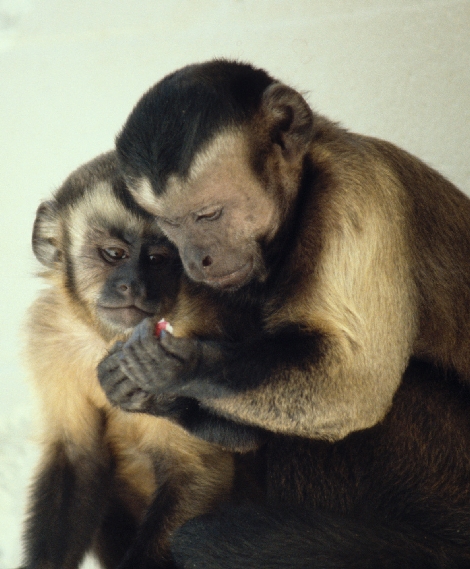Food for thought
“You and your friend are locked in cell separated by a see through thin wall with a small opening.
You have the tool but can’t reach the nuts that are sealed in a container that is placed in your friend’s cell.
Though your friend has the nuts but he needs the tool to reach the nut! So what will you do?”
Tufted Capuchin by Frans de Waal. Powell K: Economy of the Mind. PLoS Biol 1/3/2003: e77. URL: http://www.plosbiology.org/article/info:doi/10.1371/journal.pbio.0000077 (accessed on 1 April 2010)
How do you think this pair of Tufted Capuchin (Cebus apella) would react in the same scenario? Let’s take a look!
The Tufted Capuchin (Cebus apella) is a New World primate commonly found in South and Latin America. They have the largest brain relatively to their size among all the other species of monkey. This gives them the intelligences, unheard of in the wild. The Tufted Capuchin is an omnivorous animal feeding mainly on fruits, nuts, insects and small vertebrates. They are well known for astonishing problem solving abilities to help them forage for food.
In the experiment, they cooperated and later share the reward equally! Besides showing mathematical ability, they also displayed reciprocal altruism and fairness. The idea of fairness is further illustrated in the second part of the experiment where the monkey would rather go hungry than to accept less than equal treatment.
Besides Tufted Capuchin, there are other groups of animals that have displaced sense of fairness. Some examples include wolves, coyotes, elephants, rodents, bats and whales. If you are interested in the detailed write up for the examples, you can visit http://www.telegraph.co.uk/earth/wildlife/5373379/Animals-can-tell-right-from-wrong.html.
Essentially, scientists studying animal behavior believe that besides humans, animals are capable of showing complex emotions and have a sense of morality which help them to live in groups. Interestingly, it do tell us something about the evolution of fairness in humans. It seems to suggest that the sense of fairness is deeply embedded in human evolutionary history rather than a social trait learned from other humans. On a side note, in a study, statistics have shown that market integration, participation in religion and community size affect human’s sense of fairness. Perhaps, it is a combination of both? Maybe we are born with the sense of fairness, however, we are not aware of it until someone else comes “knocking at our door” to enlighten us.
References:
1. “Animals can tell right from wrong,” by Richard Gray. Telegraph UK. 23 May 2009. URL: http://www.telegraph.co.uk/earth/wildlife/5373379/Animals-can-tell-right-from-wrong.html (access on 1 Apr 2010).
2. Henrich, J., Ensminger, J., McElreath, R., Barr, A., Barrett, C., Bolyanatz, A., Cardenas, J. C., Gurven, M., Gwako, E., Henrich, N., Lesorogol, C., Marlowe, F., Tracer, D., & Ziker, J. (n.d.). Market, religion, community size and the evolution of fairness and punishment.Unpublished manuscript, Vancouver. pp1-6
3. “Monkeys Show Sense Of Fairness, Study Says,” by Sean Markey. National Geographic News, 17 September 2003. URL: http://www.primates.com/monkeys/fairness.html (access on 1 Apr 2010).
4. “Sense of fairness goes back to the monkeys,” by Jeanna Bryner. msnbc, 13 nov 2007. URL: http://www.msnbc.msn.com/id/21773403/ns/technology_and_science-science/ (accessed on 1 Apr 2010).
5. Y. Hattori, H. Kuroshima and K. Fujita, Cooperative problem solving by tufted capuchin monkeys (Cebus apella): Spontaneous division of labor, communication, and reciprocal altruism, J. Comp. Psychol. 119 (2005), pp. 335–342.

